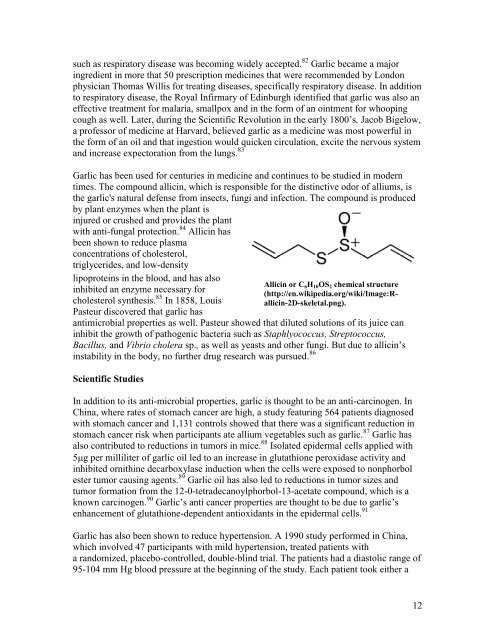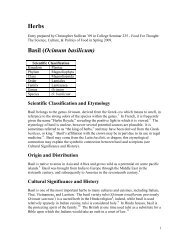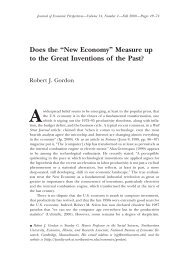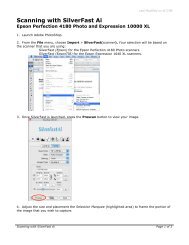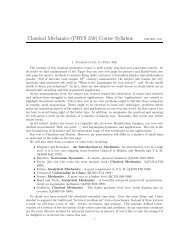Leek Scientific Classification and Etymology - Academics - Hamilton ...
Leek Scientific Classification and Etymology - Academics - Hamilton ...
Leek Scientific Classification and Etymology - Academics - Hamilton ...
Create successful ePaper yourself
Turn your PDF publications into a flip-book with our unique Google optimized e-Paper software.
such as respiratory disease was becoming widely accepted. 82 Garlic became a major<br />
ingredient in more that 50 prescription medicines that were recommended by London<br />
physician Thomas Willis for treating diseases, specifically respiratory disease. In addition<br />
to respiratory disease, the Royal Infirmary of Edinburgh identified that garlic was also an<br />
effective treatment for malaria, smallpox <strong>and</strong> in the form of an ointment for whooping<br />
cough as well. Later, during the <strong>Scientific</strong> Revolution in the early 1800’s, Jacob Bigelow,<br />
a professor of medicine at Harvard, believed garlic as a medicine was most powerful in<br />
the form of an oil <strong>and</strong> that ingestion would quicken circulation, excite the nervous system<br />
<strong>and</strong> increase expectoration from the lungs. 83<br />
Garlic has been used for centuries in medicine <strong>and</strong> continues to be studied in modern<br />
times. The compound allicin, which is responsible for the distinctive odor of alliums, is<br />
the garlic's natural defense from insects, fungi <strong>and</strong> infection. The compound is produced<br />
by plant enzymes when the plant is<br />
injured or crushed <strong>and</strong> provides the plant<br />
with anti-fungal protection. 84 Allicin has<br />
been shown to reduce plasma<br />
concentrations of cholesterol,<br />
triglycerides, <strong>and</strong> low-density<br />
lipoproteins in the blood, <strong>and</strong> has also<br />
inhibited an enzyme necessary for<br />
cholesterol synthesis. 85 In 1858, Louis<br />
Pasteur discovered that garlic has<br />
Allicin or C6H10OS2 chemical structure<br />
(http://en.wikipedia.org/wiki/Image:Rallicin-2D-skeletal.png).<br />
antimicrobial properties as well. Pasteur showed that diluted solutions of its juice can<br />
inhibit the growth of pathogenic bacteria such as Staphlyococcus, Streptococcus,<br />
Bacillus, <strong>and</strong> Vibrio cholera sp., as well as yeasts <strong>and</strong> other fungi. But due to allicin’s<br />
instability in the body, no further drug research was pursued. 86<br />
<strong>Scientific</strong> Studies<br />
In addition to its anti-microbial properties, garlic is thought to be an anti-carcinogen. In<br />
China, where rates of stomach cancer are high, a study featuring 564 patients diagnosed<br />
with stomach cancer <strong>and</strong> 1,131 controls showed that there was a significant reduction in<br />
stomach cancer risk when participants ate allium vegetables such as garlic. 87 Garlic has<br />
also contributed to reductions in tumors in mice. 88 Isolated epidermal cells applied with<br />
5�g per milliliter of garlic oil led to an increase in glutathione peroxidase activity <strong>and</strong><br />
inhibited ornithine decarboxylase induction when the cells were exposed to nonphorbol<br />
ester tumor causing agents. 89 Garlic oil has also led to reductions in tumor sizes <strong>and</strong><br />
tumor formation from the 12-0-tetradecanoylphorbol-13-acetate compound, which is a<br />
known carcinogen. 90 Garlic’s anti cancer properties are thought to be due to garlic’s<br />
enhancement of glutathione-dependent antioxidants in the epidermal cells. 91<br />
Garlic has also been shown to reduce hypertension. A 1990 study performed in China,<br />
which involved 47 participants with mild hypertension, treated patients with<br />
a r<strong>and</strong>omized, placebo-controlled, double-blind trial. The patients had a diastolic range of<br />
95-104 mm Hg blood pressure at the beginning of the study. Each patient took either a<br />
12


